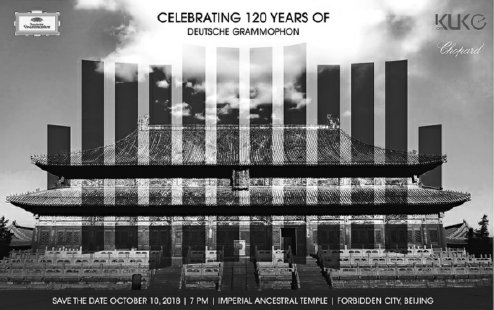Celebrating a legacy


[Photo provided to China Daily]
The piece was commissioned for the Beijing Music Festival and premiered at last year's closing concert of the event.
Another piece that will feature in the album is Rachmaninov's Symphonic Dance.
Speaking about the project, Yu says: "The album will establish a dialogue between Chinese and European orchestral music."
The idea of collaborating with Yu and SSO took shape when Trautmann met Yu at the Lucerne Festival in Switzerland last summer.
Trautmann says: "I believe that it is one of the most advanced and internationalized orchestras in China," adding that DG has been part of China's music scene for over 100 years, and that Shanghai was one of the first Chinese cities that opened up to the Western world.
The history of the SSO dates back to 1879 when it was known as the Shanghai Public Band.
In 1922, it was renamed the Shanghai Municipal Orchestra. And it was under Italian conductor Mario Paci that the orchestra promoted Western music and trained young Chinese musicians.
Yu, 54, who was born into a musically-inclined family in Shanghai, studied at the Shanghai Conservatory followed by Berlin's Hochschule de Kunste.
In early 1990s, Yu returned home and founded the Beijing Music Festival in 1998 followed by the China Philharmonic Orchestra in 2000. And he has been the artistic director of SSO since 2009.
As for DG, its story goes back to the birth of recording.
In June 1898, the company was founded in Hanover along with the first record and gramophone manufacturing works. And its director was Emile Berliner, the Hanover-born American inventor of both the disc and the player.
Now, DG is a part of the Universal Music Group, the world's largest record company.
As for the other events marking the anniversary, Garand Wu, the managing director of Universal Music China, says that besides the concert there will be three performances at Beijing's National Centre for the Performing Arts over Nov 18-20 by the Berlin Staatskapelle and the Israeli-Argentinian maestro Daniel Barenboim.
DG will also introduce its project, Yellow Lounge, to the country with a performance at Beijing's Mao Livehouse featuring British-Irish classical violinist Daniel Hope, Chinese clarinetist Wang Tao and the Zurich Chamber Orchestra.
DG's Yellow Lounge project, which aims to introduce clubbers to live classical music, was born in 2001 in Berlin's techno clubs. And since then, Yellow Lounge has organized over 130 club nights, each attracting up to 1,000 guests and a massive traditional and social media following.
"Yellow Lounge takes classical music to the younger generation. After Beijing we will take it to other Chinese cities," says Wu.
Speaking about DG's future, Trautmann says it will keep alive the tradition of the label, especially when it comes to building long-term relationships with musicians worldwide and attracting younger audiences.
"The inventor of the gramophone and the founder of the world's oldest record label, Emil Berliner, brought music into everyday life. And we still use the latest technology to bring music to people."
Contact the writer at [email protected]



































